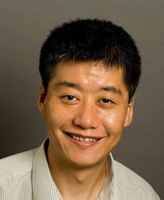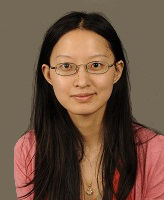Three University of Notre Dame psychologists have been recognized for their work to more precisely measure a wide range of research topics, from happiness and depression to educational achievement.
Specialists in the demanding subfield of quantitative psychology, Scott Maxwell, Zahng Guangjian, and Ying “Alison” Cheng design the statistical scaffolding needed to support measurable research into what are some of the most ephemeral of human conditions and concepts.
For a Lifetime of Achievement

Scott Maxwell, the Matthew A. Fitzsimons Chair in Psychology, was awarded the American Psychological Association’s 2010 Samuel J. Messick Distinguished Scientific Contribution Award for “distinguished theoretical or empirical contributions to basic research in psychology.”
The honor came just one year after the association awarded presidential citations to Maxwell and Notre Dame Psychology Professor George S. Howard for “a lifetime of outstanding contributions”—including “developing innovative and novel methodologies such as response-shift and retrospective designs” that have helped psychologists around the world conduct more accurate research.
Maxwell specializes in research methodology and applied behavioral statistics. While he works closely with Howard, he also partners with a number of other faculty members and current and former students.
“I feel very fortunate to have exciting colleagues in the psychology department,” Maxwell says. “It is a lot of fun to brainstorm together and help them think about ways of answering questions.”
His recent research has been focused in two main areas: the role of sample-size planning in psychological research and mediation analysis (studying the underlying causal mechanism by which one variable causes another).
In addition to his research agenda, Maxwell serves as editor for the prestigious Psychological Methods journal and teaches statistics and quantitative psychology courses for both graduate and undergraduate students in Notre Dame’s College of Arts and Letters.
“The most gratifying aspect for me of being a professor is being able to develop students into colleagues and then continue working with them for years or even decades,” he says.
New Approaches to Measurement

Assistant Professor Guangjian Zhang was honored with the 2010 Cattell Early Career Research Award from the Society of Multivariate Experimental Psychology. The annual prize recognizes a young researcher who “has made significant contributions to the field of multivariate experimental psychology and who shows promise of continued work of a very high quality.”
“This means a lot—I know that people are paying attention to my work,” Zhang says.
The Cattell award was especially gratifying, he says, because a number of his colleagues in the Department of Psychology are past winners. They include 2007 winner Gitta Lubke, the John Cardinal O’Hara, C.S.C., Associate Professor of Psychology; 2002 winner Ke-Hai Yuan, professor of psychology; and 1990 winner Scott Maxwell.
Zhang has spent the last 10 years seeking more accurate measures for abstract variables such as happiness and depression. As part of his research, he employs the Latent Variable Approach, a system in which multiple measurements are synthesized to accurately gauge a transient concept.
“This approach allows us to study a concept which cannot be measured directly, concepts for which we don’t have perfect measures,” says Zhang. “How can we make inferences from the imperfect measures we do have to really examine underlying constructs? I’m working on the underlying framework.”
And Notre Dame is a particularly good place to pursue such challenging questions, he says.
“The quantitative program at ND is one of the largest programs in the country, probably in the world, so I have wonderful tools and wonderful colleagues here.”
Innovative Methods for Educational Testing

Another rising star in the subfield, Assistant Professor Ying “Alison” Cheng, researches educational and psychological measurements, particularly the computerized adaptive testing used in schools.
In 2011, CTB/McGraw-Hill invited Cheng to be the featured speaker at its conference on psychometrics. It also awarded Cheng Innovation Research and Development grants in 2010 and 2011 for her work with Yuan.
“I’m very lucky in receiving this award,” Cheng says, “because funding innovative research takes courage and commitment from these companies. They’re taking risks, in a way, so I really feel blessed. I can try out ideas with adaptive testing, which, in my opinion, is the future of testing.”
Her work is already attracting notice. In 2009, she won the National Council on Measurements in Education’s Bradley Hanson Award, which honors “a substantive contribution to the field of educational measurement.”
Cheng’s research seeks to improve the precision and usefulness of large-scale standardized tests such as the SAT, GRE, and statewide student assessment exams. “A lot of testing is used for big-stakes decision making—whether you can graduate, get into a school, get a degree, etc.,” she says. “If anything is used for high-stakes decisions, you need to guarantee that it’s done right and fair to everybody.”
The testing research, she says, complements the other part of her work at Notre Dame teaching statistics to undergraduates and graduate students. “I am blessed to be in a very supportive and collegial environment, which is essential to sustaining high productivity,” she says.
“My research focuses on issues in education,” she says, “so I feel that my passion for research and my passion for teaching come together in perfect unity.”


